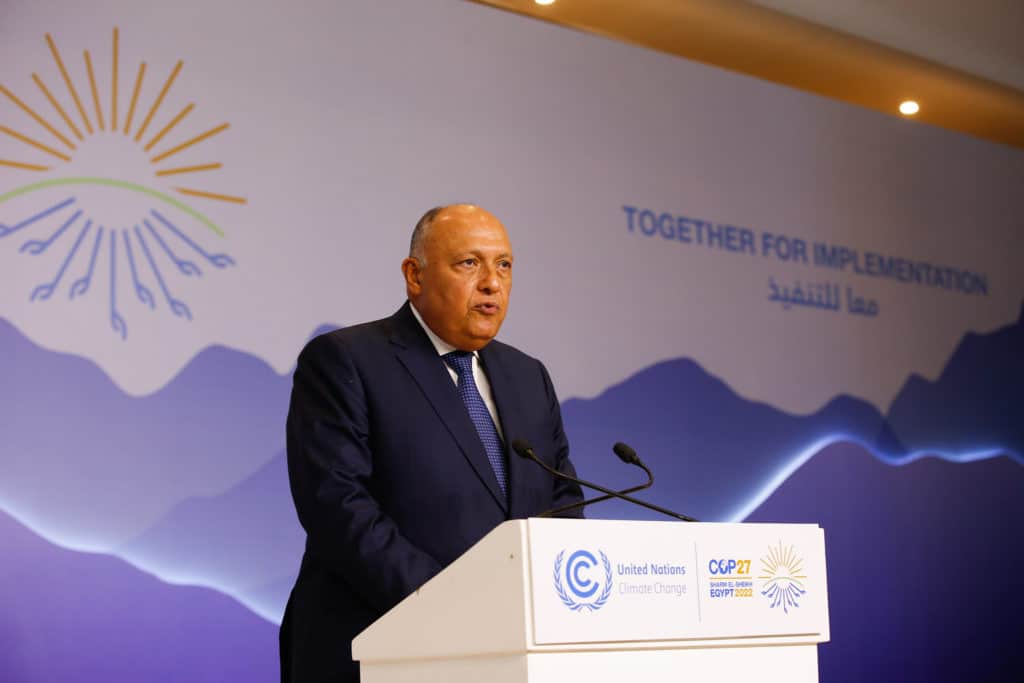The COP27 climate summit ended on Sunday after marathon weekend negotiations. Developing countries welcomed the long-awaited deal on a loss and damage fund. Meanwhile, the EU and other countries expressed disappointment at missed commitments to extend Glasgow’s coal phase down-pledge to all fossil fuels.
—
After extending talks a day and pushing back the text reveal, ministers adopted a final agreement in the early hours of Sunday, ending more than two weeks of negotiations in Sharm El Sheikh, Egypt.
The deal includes a loss and damage fund to help developing countries deal with the harm caused by global warming, a historic result that was widely celebrated among the world’s most climate-vulnerable nations. The fund aims at helping countries that are “particularly vulnerable” to climate change, the final text reads. Who would oversee the fund as well as how much money and to whom should be paid will likely be decided at next year’s climate summit, based on recommendations laid out in the COP27 final agreement.
‘Loss and damage’ – the COP term for paying up for losses and damages caused by anthropogenic climate change to natural and human systems – was placed on the summit’s agenda for the first time in nearly three decades.
“A mission thirty years in the making has been accomplished,” said Antigua and Barbuda Minister and chair of the AOSIS group of small island nations Molwyn Joseph. “Our ministers and negotiators have endured sleepless nights and endless days in an intense series of negotiations – but after the pain comes the progress.”
Despite the unprecedented deal on climate compensation, many were disappointed at the lack of commitments to broaden the COP26 pledge to phase down coal emissions to all fossil fuels – including gas and oil. While the deal didn’t make it to the final text, more than 80 countries now stand by the pledge of ending all fossil fuels and are expected to raise the issue at next year’s COP28 in Dubai.
UN Climate Change Executive Secretary Simon Stiell backed the deal, reassuring that “it gives the key political signals that indicate the phase down of all fossil fuels is happening.”
You might also like: What Is ‘Loss and Damage’ Compensation?
Reactions
“This COP has taken an important step towards justice. I welcome the decision to establish a loss and damage fund and to operationalize it in the coming period,” UN Secretary-General António Guterres said in a video message, highlighting that the voices of those on the frontline of the climate crisis must be heard.
“Clearly this will not be enough, but it is a much-needed political signal to rebuild broken trust,” he added.
#COP27 has taken an important step towards justice.
I welcome the decision to establish a loss and damage fund and to operationalize it in the coming period.
Clearly this will not be enough, but it is a much-needed political signal to rebuild broken trust. pic.twitter.com/5yhg5tKXtJ
— António Guterres (@antonioguterres) November 20, 2022
UN Climate Change Executive Secretary Simon Stiell welcomed the deal on loss and fund, saying it “moves us forward.” Speaking about the year ahead, Stiell guaranteed full support from UN Climate Change to help Parties and future COP Presidencies navigate through the new phase of implementation.
Pakistan’s climate minister Sherry Rehman – who in the past two weeks was at the forefront of discussions demanding wealthy nations for climate compensation and a recognition of the disadvantaged position of the developed world in the fight against climate change – hailed the landmark decision as a “downpayment on climate justice.”
“What we have in front of us is not enough of a step forward,” said European Commission climate chief Frans Timmermans, who’d threatened to walk away from the summit if countries didn’t agree on more ambitious emission reduction targets. “It does not bring a higher degree of confidence that we will achieve the agreements made under the Paris Agreement and in Glasgow last year.”
Featured image: Sameh Shoukry, Egypt Foreign Minister and COP27 president. Photo by UNFCCC (Flickr)
If you want to learn more about what was discussed at COP27 and what other deals were reached, check out our Week 1 and Week 2 Recaps.




















